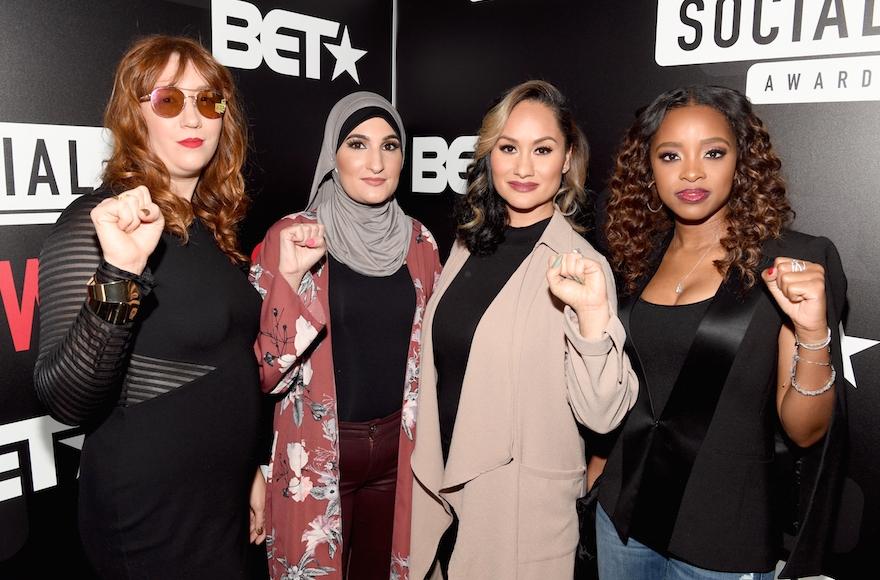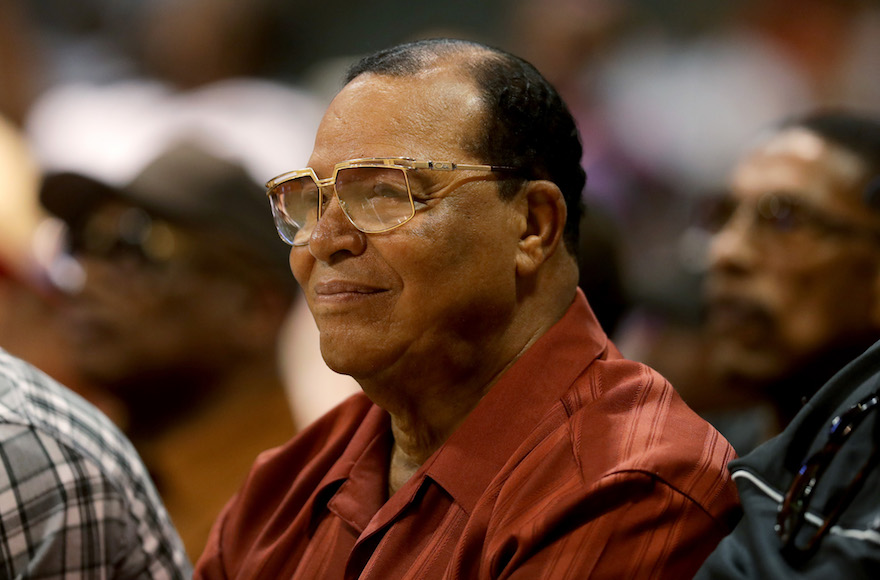Progressive Jews say they won’t give up on the Women’s March
Published March 22, 2018
At this point, however, she would still be involved with the Women’s March because she thinks there’s still time for the organizers “to address this in a positive way” and it is “one of the largest groups fighting for women’s equality in the country.”
Like a number of other female progressives interviewed by JTA, Sirbu doesn’t want charges of anti-Semitism and insensitivity to derail the agenda of the organization most closely associated with the “resistance” to the policies of President Donald Trump. But she also wants its leadership to understand the pain felt by Jewish supporters when anti-Semitism like Farrakhan’s is either ignored or excused.
“If the tenor doesn’t change,” said Sirbu, director of Rabbis Without Borders at CLAL-The National Jewish Center for Learning and Leadership, “I have to make a different decision as time goes on.”
The controversy arose following an event in February at a Nation of Islam convention in Chicago, where Farrakhan, as he has repeatedly in a 40-year career as head of the black empowerment group, again devoted part of a speech to condemning Jews. Among other things, Farrakhan denounced “Satanic Jews,” said that “when you want something in this world, the Jew holds the door,” and that he had “pulled the cover off of that Satanic Jew — and I’m here to say, your time is up.”
Tamika Mallory, one of the Women’s March’s four co-chairs, was present at the event and later shared a photo of herself with Farrakhan on Instagram. Mallory defended her association with Farrakhan, citing the Nation of Islam’s success in bettering the lives of young black men and its anti-violence efforts. Jewish groups countered that there is no excuse for anti-Semitism, and after days of pressure, march organizers released a statement that said Farrakhan’s statements about Jews “are not aligned” with the group’s principles and asserting that the leaders “love and value our sister” Mallory.
Critics said the statement did not go far enough in condemning Farrakhan and Mallory’s presence at the event.
Earlier this month, the march’s Florida branch said it was “disappointed” by the organizers’ response, while the Washington, D.C., chapter apologized to members who felt alienated amid the ordeal. The Women’s March social media director, Alyssa Klein, left the movement last week after condemning Farrakhan on Twitter and sharing tweets that called for Mallory to further distance herself from him. Klein did not respond to interview requests by JTA.
On March 12, Women’s March Canada said that Farrakhan “has no association” with the organization and that it “cannot and will not allow anti-Semitic, homophobic, transphobic, or misogynistic language to be part of our dialogue.”
Like Sirbu, other Jewish progressive leaders told JTA that they were hurt and disappointed by Farrakhan’s statement and Mallory’s presence at the event, but not ready to walk away from the movement that advocates for women’s rights, immigration reform and LGBTQ equality, among other issues. Rather, they would prefer to engage with its leadership.
Jews for Racial and Economic Justice will continue working with the national Women’s March, its executive director, Audrey Sasson, said in a phone interview.
“If we didn’t think there was possibility for transformation, then, yeah, maybe we would walk away,” she said. “But I don’t think that’s the case.”
Following Farrakhan’s remarks, JFREJ organized a meeting between Mallory and members who identified as black Jews.
“It was a powerful, honest and vulnerable important first step that opened up some space and creates now an opportunity for deeper understanding moving forward,” said Sasson, who was not present at the meeting.

The organizers of the Women’s March, from left to right: Bob Bland, Linda Sarsour, Carmen Perez and Tamika Mallory at BET’s Social Awards in Atlanta, Feb. 11, 2018. (Paras Griffin/Getty Images for BET)
JFREJ will continue conversations with the march organizers, including encouraging them and other activists to learn more about anti-Semitism, but its focus remains on fighting right-wing extremism.
“This is a moment where we really want all of us to be able to keep our eye on the prize, and that being the fact that we need to really be unified in a moment when the white nationalist far right is rising not just in the U.S. but all over the world,” she said.
For T’ruah: The Rabbinic Call for Human rights, the incident illuminated the importance of Jews being present in progressive spaces, its executive director, Rabbi Jill Jacobs, told JTA.
“If we step out of every coalition where there is anti-Semitism, if women step out of every coalition where there is sexism, and if black people step out of every coalition where there is racism, then there is not going to be anybody left, so what’s actually important is for us to stay in and not be silent at all,” Jacobs said.
Jacobs called Farrakhan’s comments “the most disgusting kind of anti-Semitism,” but said his words and Mallory’s presence at the event should not be taken as representative of progressives’ views. She said T’ruah will continue to work with the Women’s March in coalitions for relevant causes.
“Certainly in any movement there are people who are anti-Semitic, and racist and homophobic, etc., and we should call them out, but it doesn’t mean that the entire movement is treif,” she said, using a Yiddish word for non-kosher food.
Women’s March started as a worldwide protest on Jan. 21, 2017, a day after President Donald Trump’s inauguration. It was the largest single-day protest in U.S. history. Since then the organization has taken on a host of causes, and its youth initiative was recently behind the nationwide school walkouts calling for gun control following a shooting at a school in Parkland, Florida, that left 17 dead. (The organization is not involved in organizing Saturday’s March for Our Lives, another event pressing for gun control.)
Sirbu specifically wants the Women’s March to condemn Farrakhan and anti-Semitic hate speech, as well as set up conversations between leaders of the Jewish- and African-American communities to share concerns and address misunderstandings.
“The statement [issued by the Women’s March] I think tried to walk a very fine line, but in my opinion it failed,” she said. “It didn’t clearly call out his anti-Semitism. It says they don’t like what he was saying as if it were a one-time occurrence, when we have decade of [anti-Semitic] comments from Farrakhan.”

Louis Farrakhan at a basketball game at the UIC Pavilion in Chicago, July 23, 2017. (Streeter Lecka/BIG3/Getty Images)
She added: “I would say that this is a point where conversation needs to happen, and that’s my other disappointment with the Women’s March leaders: It does not feel that they are setting stage to have that conversation.”
Jody Rabhan, director of Washington operations at the National Council of Jewish Women, said the organization was “heartened” to see the Women’s March statement earlier this month. NCJW has been in contact with Mallory following the controversy and will work together with the Women’s March in coalitions on relevant issues.
“We’re in partnership with them on so many issues,” Rabhan said. “We’re still engaged in the work, and we’re not going to stop our social change work, and that is what is most important.”
















